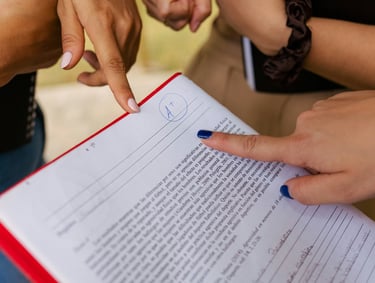Your Post-Exam Plan: What to Do After Cambridge Maths Exams
Just finished your Cambridge Maths exams? Discover a practical post-exam plan to rest, reflect, and prepare for the future the right way.
STUDENTS
Achiever Tandoh
8/30/20256 min read


What to Do After Maths Exams
The exam season can feel very tense. It’s the time of the year when students feel most anxious. And it is for a good reason, because to some extent, your future pretty much depends on your grades. For example, your grades dictate whether or not you will be able to get into that university you dream of, or study your dream course, or even whether you will receive that Christmas present your parents promised you earlier this year.
Whatever the source of your exam anxiety was, it’s finally over now.
You’ve spent weeks — maybe months — preparing for your exams, staying up late, revising formulas, and working through past papers. Finally, the day came, you sit in the exam hall, pour everything you know onto the paper… and then it’s over.
But what happens next?
For many students, the period after exams can be confusing. Some feel relief, others anxiety, and some even feel a strange emptiness. You’ve worked so hard for this moment, but now that it’s done, you may be asking: What should I do now?
This guide will walk you through a practical and effective post-exam plan. Whether your exams went amazingly well or left you feeling uncertain, these steps will help you recover, reflect, and prepare for the next stage of your academic journey.
For context we will be focusing on what to do after your Cambridge math exam, but you could do similar with any other subject. Let’s dive in.
1. Allow Yourself to Rest


Yes! This is the first and most important. Exams take a toll — mentally, physically, and emotionally. After a Cambridge Maths exam, the first thing you should do is give yourself permission to rest. Don’t feel guilty for sleeping in, watching a movie, or spending time with friends.
· Sleep helps your brain recharge and consolidate memory.
· Leisure activities restore motivation and help reduce stress.
· Socializing can lift your mood after weeks of intense focus.
Think of rest as a reset button. Without it, you risk burning out before your results even arrive.
2. Don’t Obsess Over the Paper


It’s tempting to replay every question in your head or compare answers with friends. While a little discussion is natural, obsessing over what you got wrong will only increase anxiety.
Remember:
The exam is already over — you can’t change your answers now.
Dwelling on mistakes can hurt your confidence and spoil your well-deserved break.
Examiners mark fairly, and often students do better than they think.
A better strategy is to note down areas that confused you (without dwelling) so you can revisit them later for long-term improvement.
3. Reflect on What Went Well (and What Didn’t)


Once you’ve had some rest, take a calm moment to reflect on your exam preparation. Think of it as an honest self-evaluation — not to criticize yourself, but to grow.
Ask yourself:
Did I manage my revision time well?
Which topics came naturally to me?
Where did I struggle the most?
How prepared did I feel before the test?
How confident did I feel after the test?
How could I prepare differently next time?
For example, maybe you realised that practicing past papers helped more than rereading notes. Or perhaps you noticed that you always left tricky questions too late. Reflection helps you turn this exam experience into valuable lessons for the future.
4. Celebrate Your Effort, Not Just the Outcome


Grades matter, but they don’t define your worth or effort. Preparing for Cambridge Maths exams takes dedication and discipline — qualities that will serve you well in life beyond the exam hall.
Find ways to reward yourself:
Treat yourself to your favourite snack.
Read a book for fun (instead of revision!).
Spend a day outdoors.
Acknowledging your hard work helps build a positive association with learning, rather than viewing it only as a source of stress.
5. Plan for Results Day
One source of post-exam stress is the wait for results. Instead of worrying aimlessly, create a practical plan:
Decide how you’ll collect your results (online or in person).
Think about how you’ll respond to both good and disappointing outcomes.
Remind yourself that there are always next steps — even if results aren’t what you hoped.
At Chimhanda Tutoring, we’ve seen students bounce back from setbacks and thrive. The key is to stay calm and proactive.
6. Look Ahead to Your Next Step


Whether you’re moving from IGCSE to AS, from AS to A Levels, or preparing for university, this is a great time to look forward.
Do some light planning:
Check the syllabus for your next course.
Gather textbooks or resources early.
Set broad academic goals for the new term.
This doesn’t mean going straight back into intense study. It simply means orienting yourself, so you feel confident and prepared for what’s next.
7. Keep Your Maths Skills Sharp
Even though the exam is done, your maths journey isn’t over — especially if you’re moving on to AS or A Levels. The post-exam period is the perfect time to strengthen weak areas without the pressure of a looming test.
Ways to keep sharp:
✅ Solve a few maths puzzles or logic games every now and then.
✅ Revisit challenging IGCSE topics like trigonometry.
✅ Try a handful of AS-level problems to get a “head start.”
Holidays aren’t just for play, dedicating a few hours a week to school-related activities could serve you really well and pay off big time in the next term. This light, low-pressure practice will make the transition to your next stage in maths smoother and less intimidating.
8. Explore Other Skills and Interests


Exams can take over your life. Now that they’re done, use this time to explore hobbies, passions, or skills you put on hold.
Some ideas:
Learn a coding skill.
Take up a creative hobby like drawing or music.
Volunteer, intern, or do community work.
Building new skills not only makes you more well-rounded but also gives you a healthy break from academics.
9. Take Care of Your Emotional Well-being
The post-exam period can trigger anxiety — especially if you’re worried about results. That’s why it’s important to focus on emotional health as much as academic growth.
Some helpful habits:
Journaling your thoughts and feelings.
Exercising or doing mindfulness activities.
Talking to family, friends, or even a mentor about your concerns.
Remember, exams are only one chapter of your journey. Maintaining balance between academic performance and emotional well-being is the true foundation of success.
10. Consider Extra Support for the Future


If you felt underprepared or struggled with specific areas of Cambridge Maths, this is the perfect time to seek help before your next stage. Working with a tutor can give you:
A clear revision structure.
Personalized strategies for tricky topics.
Confidence that grows over time, not just before exams.
👉 At Chimhanda Tutoring, we offer free trial lessons to help you discover how tailored support can make all the difference in your learning journey.
Final Thoughts
The end of exams is not the end of your learning — it’s just a new chapter. By resting, reflecting, and planning ahead, you can turn your post-exam period into a great opportunity for growth.
So take a deep breath, celebrate your hard work, and use this time wisely. Your Cambridge Maths exams were one milestone, not the end of the race.
And if you’re ready to get a head start, why not book a free trial lesson with Chimhanda Tutoring? Together, we can build confidence, strengthen your skills, and prepare you for whatever comes next.







